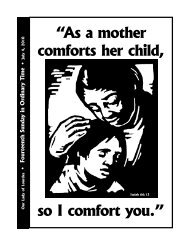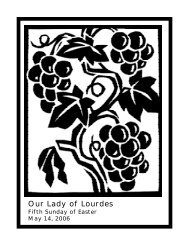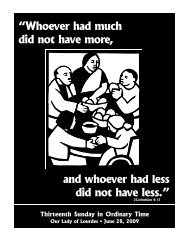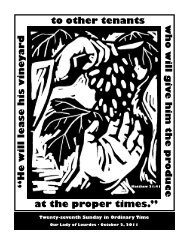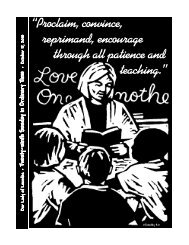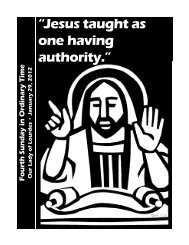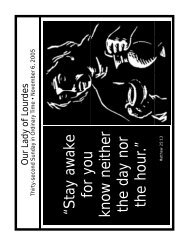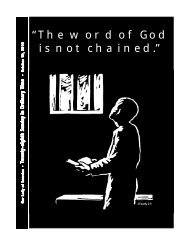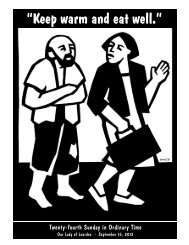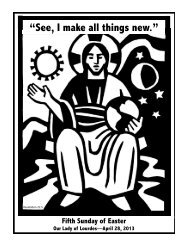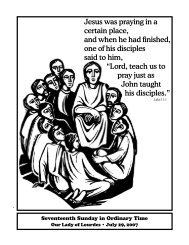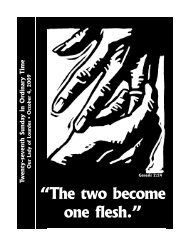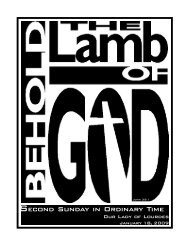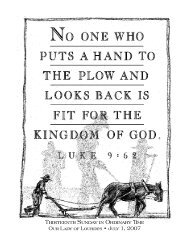“Through his suffering, my servant shall justify many.” - The Parish ...
“Through his suffering, my servant shall justify many.” - The Parish ...
“Through his suffering, my servant shall justify many.” - The Parish ...
You also want an ePaper? Increase the reach of your titles
YUMPU automatically turns print PDFs into web optimized ePapers that Google loves.
<strong>The</strong> Catholic Press Loses a<br />
Friend 2011-10-23 by Ron Rolheiser, OMI<br />
No community should botch its deaths! Those are<br />
the words of the famed anthropologist, Mircea Eliade, and I<br />
use them here to introduce a tribute to Otto Herschan, a long<br />
-time Catholic publisher, who died on July 12 at the age of<br />
84.<br />
For <strong>many</strong> years he was the publisher and Managing<br />
Director of a number of national Catholic weekly newspapers,<br />
including the Catholic Herald in England, the Scottish<br />
Catholic Observer in Scotland, and the Irish Catholic in<br />
Ireland. He brought an interesting background to Catholic<br />
journalism.<br />
He was born in Austria and, at age 10, came to<br />
England as refugee with <strong>his</strong> mother just before World War<br />
II. His father, who put <strong>his</strong> wife and Otto on the Orient Express<br />
bound for London just before he died, had been an<br />
Austrian ar<strong>my</strong> officer and in the first chapters of Otto's autobiography,<br />
Holy Smoke, he describes the trials of Catholicism<br />
in Austria as it was passing into Nazi control.<br />
Upon arriving in England, Otto was educated by<br />
the Benedictines at their school in Herefordshire, Belmont<br />
Abbey. After graduating, he worked briefly in accountancy<br />
and advertising, before enrolling for a college degree, but<br />
lack of funds obliged him to leave after a year. Otto then<br />
turned <strong>his</strong> energy to the theater, joining the Boltons <strong>The</strong>atre,<br />
the best known of London's theatrical clubs in the 1940s.<br />
He worked there in a number of capacities: scene painter,<br />
actor of small parts, and eventually as theater manager, becoming<br />
at the tender age of 21 the youngest theater manager<br />
in London. But financial troubles forced the Boltons <strong>The</strong>atre<br />
to close in 1950. He then worked for a time in television,<br />
helping found the first commercial TV station in England.<br />
T<strong>his</strong> led him back to the theater where, in 1954 at a<br />
fundraising event, he met the chairman for the Catholic<br />
Herald who invited him to take over the management of the<br />
paper. He protested, saying that he knew nothing about running<br />
a newspaper and was told in reply: "That may be a<br />
very good start!" He then served as Managing Director of<br />
the Catholic Herald for nearly 50 years.<br />
Under <strong>his</strong> vision and guidance, the Catholic Herald<br />
evolved from serving a small, closed constituency within<br />
which the purchase of a copy was regarded as an act of piety<br />
to become a national and international Catholic weekly<br />
that appears on newsstands through the English-speaking<br />
world. He recruited talented journalists from the secular<br />
press and the Catholic Herald became a feisty and highly<br />
sought-after newspaper. As publisher of a number of Catholic<br />
newspapers both during and after Vatican II, he was<br />
always able to have <strong>his</strong> newspapers walk that fine tightrope<br />
between liberal and conservative ideologies. Invariably <strong>his</strong><br />
newspapers were considered too liberal for the conservatives<br />
and too conservative for the liberals. Not a bad critique.<br />
As a publisher with a very limited budget, Otto was<br />
good at spotting talented young journalists, hiring them to<br />
edit <strong>his</strong> newspapers, and then after a few years giving them<br />
<strong>his</strong> fullest blessing as they moved on to more profitable jobs<br />
within the secular press. In t<strong>his</strong> way, he helped launch the<br />
career of a number of very good young journalists; but it<br />
was a win-win situation for both, the aspiring young editors<br />
looking to make a start and for the Catholic press who benefited<br />
from their talent. During <strong>his</strong> years in publishing he also<br />
developed life-long friendships with leading church people<br />
everywhere, including Archbishop Denis Hurley of South<br />
Africa and Cardinal Franz Konig of Vienna.<br />
I first met Otto in 1990, when he recruited me to<br />
write a column for <strong>his</strong> newspapers and, in the twenty years<br />
since, I have enjoyed a wonderful friendship with him and<br />
<strong>his</strong> wife, Marie. Despite being humble and approachable,<br />
he was always a little larger than life. He brought color into<br />
a room. He loved life, loved work, deeply loved <strong>his</strong> wife,<br />
and especially loved long, late-night dinners, stoked by<br />
good wine, ecclesial talk, banter, humor, and friendship,<br />
capped-off with good cigars. Time stopped during these<br />
dinners, a glance at your wristwatch was forbidden, and<br />
even though you paid a price for it in tiredness the next day,<br />
you knew that, during those hours at table together, you<br />
were doing what you are supposed to be doing your whole<br />
life, just enjoying friendship, love, food, banter, and holy<br />
talk together. I will always treasure memories of those dinners<br />
in Otto's various clubs, as well as of a couple of all-day<br />
drives through the English countryside in mid-summer, car<br />
windows wide-open, pipe and cigar smoke wafting about,<br />
and Otto's eyes surveying the landscape, checking it out for<br />
its beauty and for the possibility of it containing a pub.<br />
No community should botch its deaths! And so it's<br />
important to highlight that in Otto Herschan's passing the<br />
church and the world lost a true gentleman, a good<br />
friend, a man of wit, and man who, like Jesus, tried<br />
to draw people of very persuasion together around a<br />
common table of friendship and faith.<br />
Used with permission of the author, Oblate Father Ron Rolheiser.<br />
Currently Father Rolheiser is serving as President of<br />
the Oblate School of <strong>The</strong>ology in San Antonio, TX. He can be<br />
contacted through <strong>his</strong> website-www.ronrolheiser.com.<br />
14 OLL-#439



